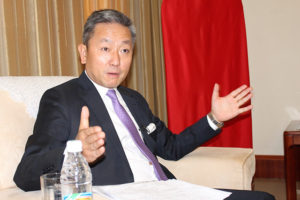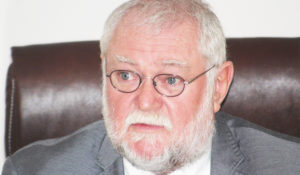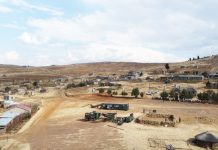By Shinovene Immanuel | 10 June 2020
CHINA has purportedly given the Namibian government a list of five state-owned companies that should bid to expand the Hosea Kutako International Airport at an estimated N$3,5 billion.
The government cancelled the airport expansion tender five years ago after allegations of bribery in the then N$7 billion deal.
President Hage Geingob has said the government saved billions by cancelling that tender.
“N$4 billion that could have gone to corruption. N$4 billion! That is action [against corruption],” Geingob said during his state of the nation address last week.
Geingob’s administration has been hell-bent on carrying out the new airport expansion project.
Namibia went back to China, seeking finance to fund the same project at a reduced cost.
But the dust of possible favouritism refuses to settle.
There are fresh allegations that two Chinese companies are already leading the race for the tender before the bidding process has started, leaving Namibia with few options to potentially save costs by having more bids.
Two people familiar with this deal said companies recommended by the Chinese government include China Harbour Engineering Company, China Jiangxi International and Aviation Industry Corporation of China (Avic International).
The two other Chinese state-owned companies, Weihai International Economic and Technical Cooperative and PowerChina, known as Power Construction Corporation of China, have also been suggested for the planned project.
Sources said China Harbour Engineering Company and Avic International are leading the race to clinch this deal.
China Harbour Engineering Company has over the years benefited from Namibia’s tender boom.
The company constructed the inflated N$7 billion fuel-storage facility and the N$3,5 billion Walvis Bay port expansion for the state-owned Namibian Ports Authority (Namport) under Bisey /Uirab’s management.
Sources said there has been a push to award the airport contract but there appears to be pressure to eliminate some companies from the five recommended by China.
A person familiar with the matter said a prominent businessman approached the Chinese embassy recently for support on this deal, but was allegedly rebuffed.

Sources said ambassador Zhang Yiming held meetings in the past two weeks with senior Namibian government officials on the implementation of this airport expansion contract.
Multibillion dollar tenders like the airport deal often offers competition among power brokers to push for companies to win the contract in exchange for commissions or kickbacks.
Sources familiar with this deal said kickbacks for the deal could be as much as N$300 million.
Minister of finance Iipumbu Shiimi said he is not aware of the Chinese recommendations.
“Such details have not reached my office yet,” Shiimi told The Namibian on Monday.

Chinese embassy spokesperson Lu Hairong said the selection of the general contractor for this project is part of the consensus between the two governments.
“The line ministries of the Chinese government shall screen and recommend a shortlist of Chinese companies operating in Namibia, which are competent and qualified for this important project to the Namibian government,” Lu told The Namibian yesterday.
She said the bid winner will be selected through the bidding process managed by the Namibian authorities in accordance with laws.
“The Chinese embassy in Namibia neither gets involved nor interferes in the selection process,” she said.
She said the financial package – which consists of a concessional loan and a grant – are favourable to Namibia and reflects the special relationship between the two countries.
“As far as I know, the scope of the project has been finalised. The other details on how to implement it are still in discussion between the line ministries of the two governments,” Lu said.
SCHLETTWEIN’S LETTER
Official documents show the Chinese embassy has been involved in the tender.
Former minister of finance Calle Schlettwein wrote a letter titled ‘Hosea Kutako International Airport Expansion Project’ to Chinese ambassador Zhang on 3 February this year.
Schlettwein informed him he was pleased to submit an amended feasibility report for the airport east of Windhoek.

“In the above letter, you indicated you are in the process of screening Chinese contractors for the project and will submit the shortlisted companies when completed,” said Schlettwein, who replied to a letter from Zhang dated 20 January 2020.
“We request that the shortlist should contact five or more companies to enable a fair competitive bidding, which could benefit the country in terms of cost and quality,” Schlettwein said.
The then finance minister said: “It is worth stating that all procurement arrangements will be subject to the conclusion of the loan agreement between the Export-Import Bank [of China] and the Namibian government.”
Schlettwein was not reachable for comment.
/Uirab, currently chief executive officer of the Namibia Airports Company, is set to implement this contract and said he was not aware of the recommendations.
“I have not attended any meeting discussing the progress of the project you are referring to, neither do I have any knowledge about any recommended companies by the Chinese government to the Namibian government,” he said.
Geingob thanked Chinese president Xi Jinping in April this year for funding for a new Namibian airport construction project.
“We would like to express our appreciation for the special financial package for our main airports. We are very happy to know about the package to help us build our new airport,” he said.
The president added the new airport would put China’s assistance to Namibia in public view.
“We must still come back because of this crisis [Covid-19] to ask for more benefits in that relationship regarding the airport,” Geingob said.






